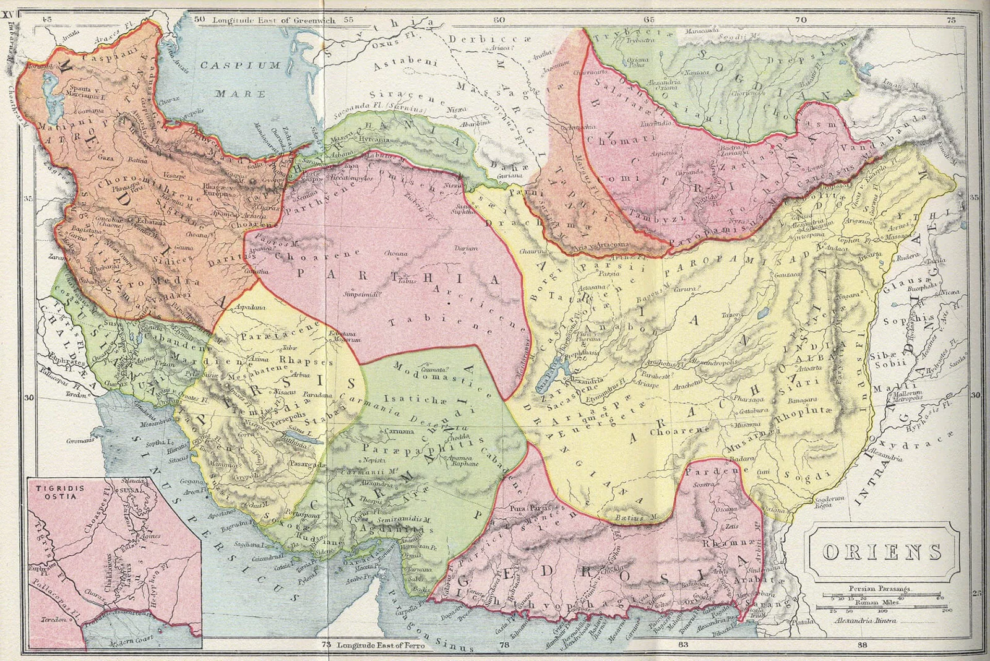Iran, formerly Persia, has a fascinating history. It was the ancient world’s superpower for two centuries and rose to international prominence several times since then. It is one of the world’s oldest civilizations, with a history of settlement dating back past 11,000 BC. Around 6,000 BC, it was the place where gold, silver, copper and some other metals were first discovered. Around 2,000 BC, Aryan tribes moved into the region, which made the country known as Ariana or Iran, meaning “the land of Aryans.” Aryan was understood as the antonym of “barbarian”, which meant a civilized and free person.
The Aryans moved into the region of Persis or Parsa, in the southwest of Iran. The region is known in the Western languages as Persia, and its people, Persians. The Persians were united as a nation by the year of 625 BC. A century later, they had conquered the whole of the Iranian plateau.
In time, from its capital of Persepolis, the Persian Empire extended its rule into three continents, covering Eastern Europe, North Africa and Central Asia. At its peak, it was the greatest empire that had yet existed in history, and it remains to this day the largest empire ever as a percentage of world population. It extended from Egypt in the west to India in the east and from much of Ukraine in the north to Yemen in the south.
Cyrus the Great founded the world’s first biggest empire, Persia, stretching from modern-day Syria through Turkey to India’s borders. Cyrus is considered the father of human rights for issuing the “first bill on human rights” after capturing Babylon peacefully. Cyrus instituted freedom of worship and allowed people to return to their ancestral homelands.
In 550 BC, Cyrus, called anointed (“messiah”) in the Bible, allowed Jews to go back to Israel after 70 years of captivity imposed by the Babylonians. The Jews have never forgotten the Persian generosity for their existence. In the Hebrew Bible, there are over 200 references to Persia, Persians, Persian kings, and Persian contributions to humanity. Cyrus alone is mentioned 19 times. Persia is spoken of as a “blessing to mankind”. Whether the Bible is inspired scripture or just historical record, one comes away with the impression that Persia (Iran) will survive the ages and friendship with it is a sure way to be heaven-blessed.
Persia was later temporarily captured by the Greeks and rivaled the Roman Empire, which failed many attempts to subdue its eastern neighbor. Iran was only finally conquered by the Arabs in the 7th century.
Yet, within a century, the Persians bounced back. They survived numerous invasions by Mongols, Turks, and Afghan rebels but kept their unique multi-ethnic national unity.
What emerged was quite exhilarating. Iran produced some of the world’s greatest intellectuals, and they changed the world forever. These included Ibn Hayyan (known in the Latin West as Geber, died in 815), Khwarazmi (Lat. Algorismus, d. 850), the Banu Musa brothers (800-850), al-Farabi (Lat. Alpharabius, d. 870), Razi (Lat. Rhazes, d. 925), al-Balkhi (d. 934), Al-Sufi (Lat. Azophi, d. 986), Ibn Sina (Lat. Avicenna, d. 1037), Al-Biruni (d. 1048), Umar Khayyam (d. 1131), Al-Tusi (d. 1274), Qotb al-Din Al-Shirazi (d. 1311) and Kamal al-Din Al-Farisi (d. 1319).
Each of these great individuals left a permanent mark on human intellectual progress. Al-Farabi’s influence on the West is well known. Among others, he influenced Thomas Aquinas (d. 1274), the famous theo-philosopher who would come to be the most influential thinker in the Catholic Church.
Without their ongoing influence, transmitted to Europe over centuries via conduits such as Moorish Spain and Venetian trade, the Renaissance could have looked very different.
As late as the 17th century, Mulla Sadra (d. 1636) expanded theo-philosophy by a combination of reasoning, spirituality and meditation.
As for the poets, Iran produced poets like Rumi (d. 1273), Saadi (d. 1291) and Hafiz (d. 1389) who deeply influenced world literature and philosophy.
There is substantial evidence that much of the scientific progress credited to the Westerners was earlier developed by the Persians. For instance, a mathematical formulation in astronomy credited to Copernicus is identical to that of al-Tusi, who preceded him by about 300 years. Umar Khayyam, famous for his Rubaiyat, was also a polymath. Evidence is emerging that Rene Descartes (d. 1650) plagiarized much of his scientific work from Khayyam who preceded him by over 500 years.
Nevertheless, all that glory vanished In 1747 with the death of Nader Shah. Nader was the last monarch to rule a united Persian Empire and became famous by defeating the Mughal Empire in India in 1739 and ransacking Delhi, capturing the incredible peacock throne. After him, the country fell into a period of anarchy, fracturing into a number of states. Rebels assumed autonomy in Afghanistan and Bahrain. The Ottomans grabbed some territories. Much of the Caucasus regions declared independence, while Nader’s Afsharid dynasty was reduced to a tiny rump state.
From 1796, the Qajar clan took power and initially unified the remnants of the empire. Later under British influence, the Qajar dynasty lost Armenia, Azerbaijan, Dagestan, Georgia and some other notable territories to Russia. When the dust settled, Iran was intact but had lost almost all of its empire in West and Central Asia.
In 1925, with British help, Reza Khan overthrew the Qajars. Under British control, he lost substantial territories to Afghanistan, Iraq, Turkey and the Soviet Union. In 1941, the British removed him and installed his son, Mohammad Reza, who gave away Bahrain along with about 50 islands to please Britain and the US.
In 1979, foreign influence was removed when the dynasty was overthrown by a revolution. The Islamic Republic replaced it and now rules the country.
Foreign Interests
“I tell you plainly that a dark, dangerous future lies ahead, and that it is your duty to resist and to serve Islam and Muslim people,” warned Ayatollah Ruhollah Khomeini, the founder of the Islamic Republic of Iran. Iran’s independence was too much to bear for the US and British. Ever since the revolution, they found it difficult to come to terms with that reality after years of access to Iran’s resources. They have been determined to “change regime” through hostilities, threats, sanctions and propaganda.
Iran’s problem is its immense natural resources. Iran is ranked the fifth nation in the world in terms of the value of its natural resources. Its resources include chromium, coal, copper, crude oil, iron ore, lead, manganese, natural gas, sulfur and zinc. It has the world’s second-largest known gas reserve and fourth oil reserve. It is chiefly for the access to these resources, especially oil and gas, that the US leads Britain and the EU in spending much of their budgets and time to effect “regime change” in Iran. They are all oblivious to the fact that an overwhelming number of Iranians support the regime, as demonstrated in the recent anniversary of the Republic when over 20 million, a quarter of the population, participated in the parades.
In 1953, it was this desire to access Iranian oil, under the pretext of fear of communist influence in Iran, that caused the US to work with the British to overthrow the first-ever democratically elected government in Iran and install a ruthless puppet, the Shah. At the same time, the US gave little attention to genocide in Cambodia, Darfur, Myanmar and Rwanda, responding only belatedly even to atrocities in Bosnia, in NATO’s backyard.
The British and the US have not given up intervening in Iran. They have long planned to break up Iran as they balkanized Yugoslavia into numerous hostile countries based on ethnicities by instigating riots. The US has continued having a “covert relationship” with numerous ethnic terrorist groups in Iran. The US support of the MEK terrorist group is well known. So far, the Islamic Republic has deftly resisted the foreign aggression.
The 2022 unrest has given more opportunity to Iran’s adversaries. The US and its allies, especially Israel and Saudi Arabia, have intervened in the domestic affairs of Iran. Through BBC, VOA, London-based Persian TV, and social media outlets, the US and its allies continue sensationalizing the protests in Iran in hope of instigating civil war, leading to “regime change.” If human rights were truly their objectives, they would have focused on Saudi Arabia, one of the world’s worst human rights violators. As for the oppression, attention should have been given to the apartheid state of Israel for brutally oppressing Palestinians for years. Unsurprisingly, Iran reportedly has considered the US, Britain, Israel and Saudi Arabia fermenting unrest in the country.
Change is coming for Iran. After years of contributing to hostility in Iran, Saudi Arabia has decided to break away from the US front and mend relations with the country through China. They have already exchanged ambassadors. Other Arab countries are following suit. That move paid off well. Saudis are now pursuing opening relations with other members of the “Axis of Resistance,” namely Syria and Yemen.
With the US-led NATO engulfed in the Russo-Ukrainian War, Iran has a great opportunity to live up to its ancient reputation, enhancing global peace.
After years of spending billions of dollars in support of the US plan for the “regime change” in Iran, Saudi Arabia realized that they were wasting their funds. They saw Iran as vital to real progress in the region. Knowing that China had good relations with Iran, they opened up to China, leveraging its growing capabilities to enhance relations with Iran. When they asked China to talk to Iran on their behalf, China gladly cooperated. The result was the 2023 agreement to resume their diplomatic relations. That was welcomed by other Arab countries that are rushing to normalize relations with Iran. Syrian Bashar Assad was welcomed by the Arab League with his powerful speech that the region must be cleared from foreign powers. The message resonated with other leaders. Iranian and Saudi teams are now working together to resolve other issues in the region, such as the Yemen conflict.
If Iranians continue to play their cards right, they could finally bring peace to the troubled region, which has been under foreign influence for over a century. If the US wants to have some voice in the future in that part of the world, it must find a way to collaborate with Iran as the Saudis did.
Source : FAIROBSERVER





